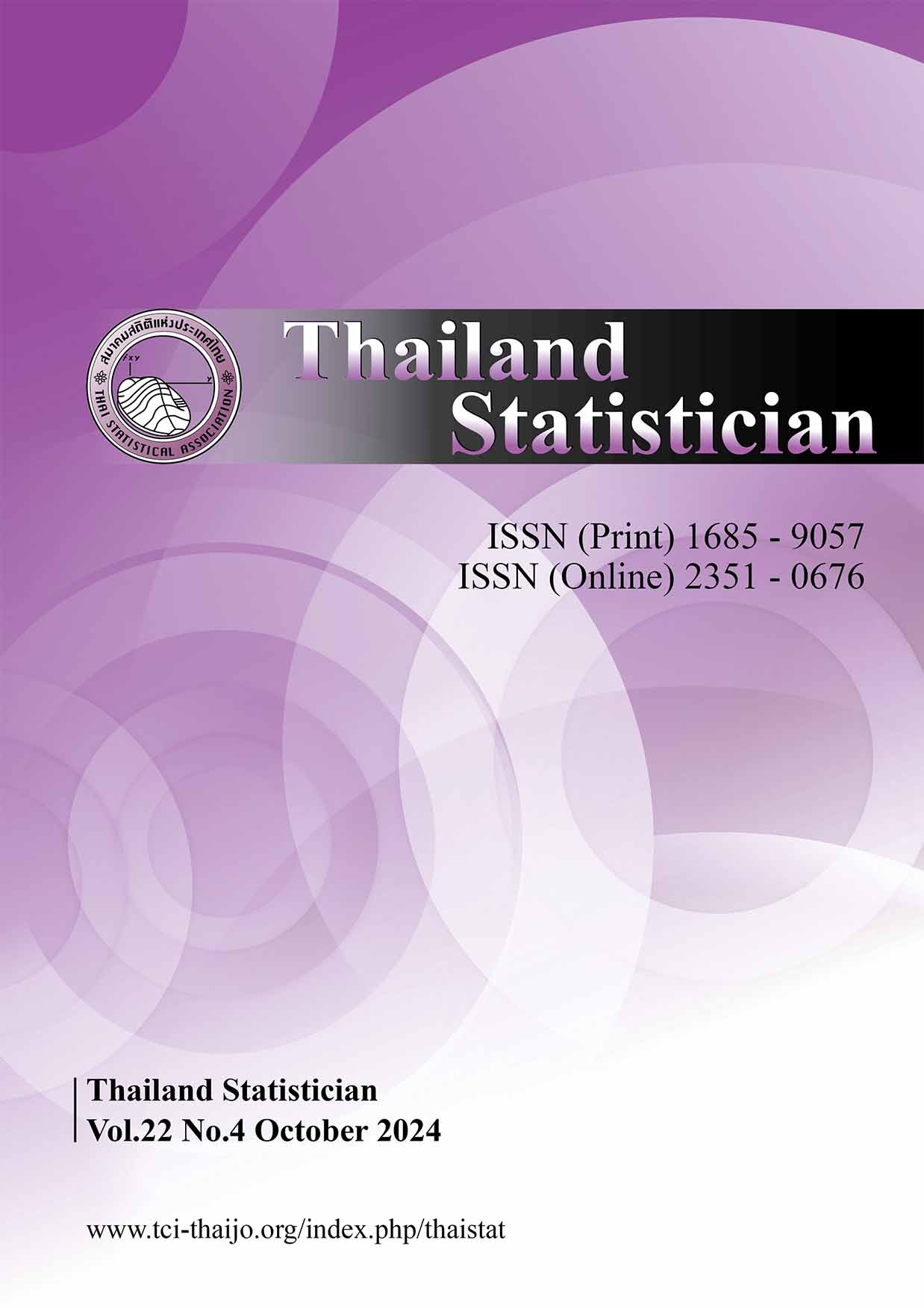A New Generalized Exponentiated Weibull Distribution: Properties and Applications
Keywords:
Weibull model, lifetime distributions, exponentiated generalized distribution, moments, maximum likelihood estimationAbstract
The Weibull distribution is the most important statistical distribution to study the data especially from reliability theory. We propose a new generalized exponentiated Weibull distribution which is developed by using the exponentiated Weibull distribution and exponentiated generalized Weibull distribution. Various well-known lifetime distributions are particular case of the proposed distribution. The failure rate of the newly constructed distribution is monotone and non-monotone such as bathtub, unimodal, increasing and decreasing. Thus, the proposed model seems more flexible. Some important mathematical properties of the proposed distribution are studied and simple expressions for the generating function, moments, mean deviations, entropy, and order statistics density are provided.
Some important aspects of the distribution are also discussed numerically and graphically. Parameters
are estimated by using popular technique of maximum likelihood. We apply newly developed model
to two real data sets and make comparison with some well-known sub-models. We explore that the
proposed model is more flexible and useful as compared to the particular sub-models for modeling
lifetime, skewed and survival time data.
References
Aarset MV. How to identify a bathtub hazard rate. IEEE Trans. Reliab. 1987; 36(1):106-108.
Abbas S, Zaniab S, Mehmood O, Ozal G, Shahbaz MQ. A new generalized weighted exponential
distribution: Properties and applications. Thail Stat. 2022; 20(2): 271-283.
Ahmad Sartawi H, Abu-Salih MS. Bayesian prediction bounds for the Burr type x model. Commun
Stat Theory. 1991; 20(7):2307-2330.
Ashraf JH, Ahmad M, Khalique A, Iqbal Z. A new generalized exponential distribution: Properties
and applications. Int J Anal Appl. 2020; 18(5): 799-818.
Birnbaum ZW, Saunders SC. Estimation for a family of life distributions with applications to fatigue.
J Appl Probab. 1969; 6(2): 328-347.
Cordeiro GM, Ortega EM, da Cunha DC. The exponentiated generalized class of distributions. J Data
Sci. 2013; 11(1): 1-27.
Cordeiro GM, Afify AZ, Yousaf HM, Cakmakyapan S, Ozel, G. The Lindley Weibull distribution:
properties and applications. An Acad Bras Cienc. 2018; 90: 2579-2598. ˆ
Diniz Marinho PR, Bourguignon M, Barros Dias CR. Adequacy Model: Adequacy of Probabilistic
Models and General Purpose Optimization. R package version 2.0.0; 2016.
Elbatal I, Muhammed HZ. Exponentiated generalized inverse Weibull distribution. Appl Math Sci.
; 8(81): 3997-4012.
Eugene N, Lee C, Famoye F. Beta-normal distribution and its applications. Commun Stat Theory. 2002; 31(4): 497-512.
Famoye F, Lee C, Olumolade O. The beta-Weibull distribution. J Stat Theory Appl. 2005; 4(2):121-136.
Fisher RA, Tippett LHC. Limiting forms of the frequency distribution of the largest or smallest member of a sample. Mathematical Proceedings of the Cambridge Philosophical Society; 1928. vol. 24, p. 180-190.
F.R.S., L.R. Xii. on the resultant of a large number of vibrations of the same pitch and of arbitrary
phase. London, Edinburgh, Dublin Philos. Mag J Sci. 1880; 10(60): 73-78.
Gupta RC, Gupta PL, Gupta RD. Modeling failure time data by Lehman alternatives. Commun Stat
Theory. 1998; 27(4): 887-904.
Gupta RD, Kundu D. Exponentiated exponential family: an alternative to gamma and Weibull distributions. Biometrical J. 2001; 43(1): 117-130.
Jiang R, Murthy D. The exponentiated Weibull family: a graphical approach. IEEE Trans Reliab.
; 48(1):68-72.
Johnson NL, Kotz S, Balakrishnan N. Continuous univariate distributions. New York: John Wiley & Sons; 1994.
Kumar CS, Nair SR. On log-inverse Weibull distribution and its properties. Am J Math Manag Sci. 2018; 37(2): 144-167.
Lai CD, Murthy DNP, Xie M. Weibull distributions. Wiley Interdiscip Rev Comput Stat. 2011; 3(3): 282-287.
Lee C, Famoye F, Olumolade O. Beta-Weibull distribution: some properties and applications to censored data. J Mod Appl Stat Methods. 2007; 6(1): 17.
Mudholkar GS, Srivastava DK. Exponentiated Weibull family for analyzing bathtub failure-rate data.
IEEE Trans Reliab. 1993; 42(2): 299-302.
Mudholkar GS, Srivastava DK, Freimer M. The exponentiated Weibull family: a reanalysis of the
bus-motor-failure data. Technometrics. 1995; 37(4):436-445.
Murthy DP, Xie M, Jiang R. Weibull models, Vol. 505, New York: John Wiley & Sons; 2004.
Nadarajah S, Cordeiro GM, Ortega EM. The exponentiated Weibull distribution: a survey. Stat Pap.
; 54(3): 839-877.
Nadarajah S, Kotz S. The exponentiated type distributions. Acta Appl Math. 2006; 92(2): 97-111.
Nassar MM, Eissa FH. On the exponentiated Weibull distribution. Commun Stat Theory. 2003;
(7): 1317-1336.
Oguntunde P, Odetunmibi O, Adejumo A. On the exponentiated generalized Weibull distribution: a
generalization of the Weibull distribution. Indian J Sci Technol. 2015; 8(35).
Pal M, Ali MM, Woo J. Exponentiated Weibull distribution. Statistica. 2006; 66(2):139-147.
Peng X. An extended weibull model with variable periodicity. J Syst Sci Complex. 2018; 31(3):841-
R Core Team. R: A Language and Environment for Statistical Computing. R Foundation for Statistical
Computing, Vienna, Austria. 2018.
Shafiei S, Darijani S, Saboori H. Inverse Weibull power series distributions: properties and applications. J Stat Comput Sim. 2016; 86(6):1069-1094.
Weibull W. A statistical theory of strength of materials. IVB-Handl. 1939.
Weihull W. A statistical distribution function of wide applicability. J Appl Mech. 1951; 18: 290-293.
Downloads
Published
How to Cite
Issue
Section
License

This work is licensed under a Creative Commons Attribution-NonCommercial-NoDerivatives 4.0 International License.




